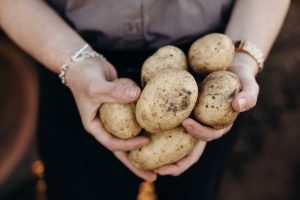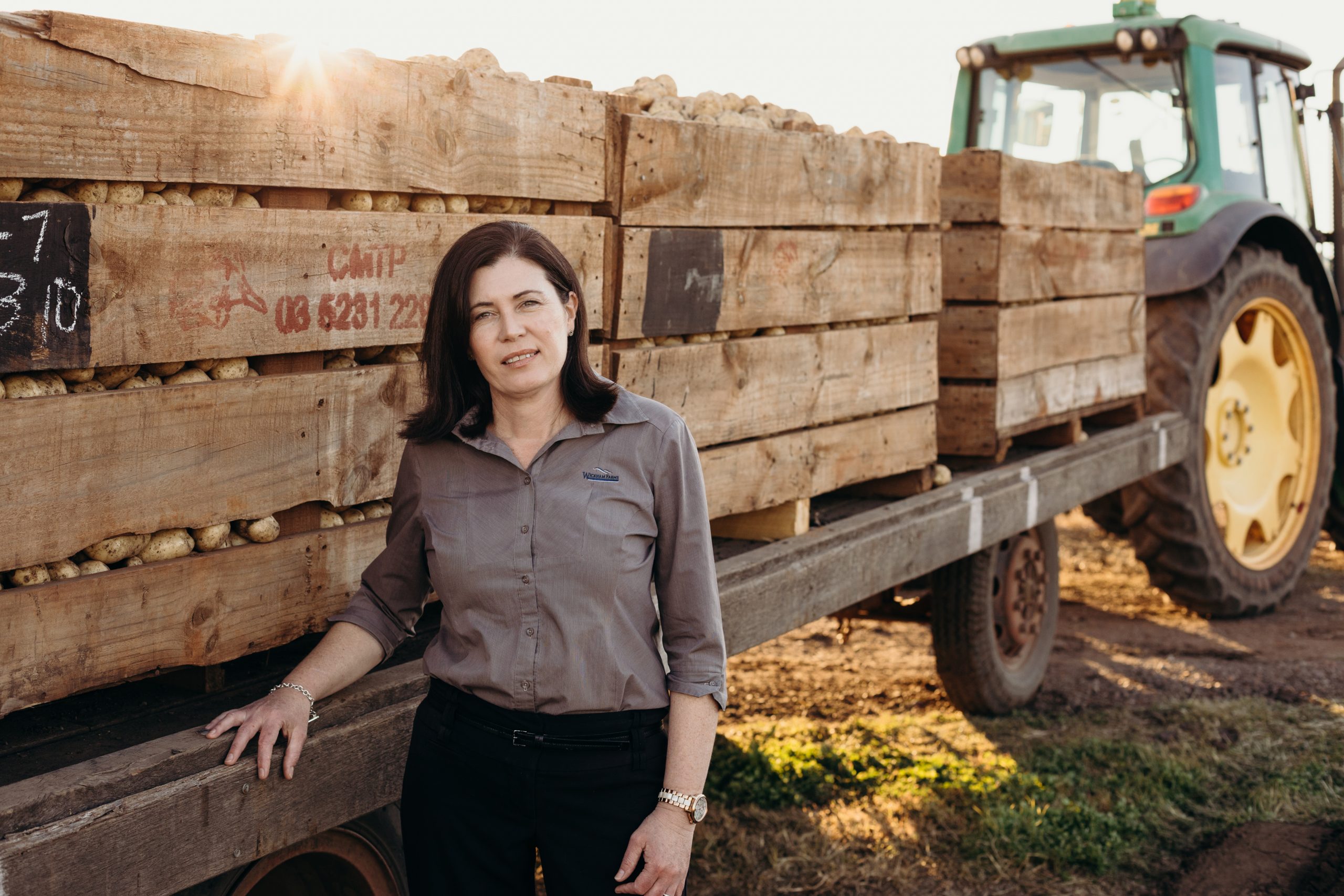Future Growth for Potatoes: current and emerging trends as drivers to growth and innovation
Potato grower Kerri-Ann Lamb from Killarney, Queensland, was awarded a Nuffield Scholarship with support from Hort Innovation through the fresh potato research and development levy. Through her scholarship, Kerri-Ann examined potato growers and packers’ value-add facilities as well as supermarket offerings across Australia, New Zealand, Austria, Germany, Switzerland, Netherlands, United Kingdom, Ireland, Hong Kong and China, to identify main areas for driving change in the potato industry.
To ensure future sustainability and growth for Australia’s potato industry, it’s critical that producers continue to innovate to find responsive, modern and creative ways to meet consumer sustainability demands and expectations. That’s according to Kerri-Anne Lamb who, with support from Hort Innovation, investigated how potato farmers across the globe are responding to the challenges of a changing industry.
Travelling across Australia, New Zealand, Austria, Germany, Switzerland, Netherlands, United Kingdom, Ireland, Hong Kong and China, Kerri-Ann met with growers, packers, product manufacturers, private companies, government institutes, retail outlets and trade shows to investigate drivers, emerging trends and opportunities for the potato industry.
She identified five key factors that are driving change within the potato industry, including:
- Environmental concerns both for consumers and producers.
- Evolving consumer behaviour and consumption patterns.
- Industry and messaging.
- Marketing strategies.
“Despite being the third most important food crop in the world behind rice and wheat, the potato industry is facing a slow decline in consumption. While travelling, it was very evident that successful farmers were those sharing their story with consumers, being transparent in their messaging and building trust between producer and customer,” Kerri-Ann said.
“With consumers being increasingly focused on ensuring social responsibility in their purchase decisions, it has become more important than ever to tell the right brand story, particularly through the shared connection between sustainability and environmental impacts. This has led to sustainable packaging becoming a major consideration within the potato industry, as many producers rely on plastic packaging due to its efficiency and presentation.
“I met with only one small New Zealand company making decisions around responsible product packaging, that considered future trends and buying habits. Oakley’s Premium Fresh Vegetables in Southbridge, New Zealand, packages its potatoes into small, recyclable, carboard boxes that keep the potatoes cool, moisture-free and protected from light. This packaging is not only great for the shelf life of the product and the environment, but the pack size is convenient and on-trend with recent consumer buying habits, enhancing the possibility of a sale to a sustainability-conscious consumer.”

Further observations
Kerri-Ann said declining consumption, profit margins and a growing focus to address sustainability challenges within the potato industry has driven global innovation in both production and how the industry adapts to consumer trends.
“The potato industry has been operating the same way for a long time, but technology and automation is providing producers with the opportunity to address costs and maintain a competitive advantage,” she said.
“Travelling to Belfast, Northern Ireland, I met with the owners of Mash Direct who have diversified their business, ranging from growing potatoes to providing mashed ready-to-heat potato products. Initially selling its products at the local market directly, Mash Direct is now in its sixth generation supplying independent supermarkets to their stable customer base.
“Having a strong customer focus, the business has built its expansion around sustainability and changing consumer trends by directly engaging with its customers and ensuring products are in line with their needs and expectations.”
Kerri-Ann said consumer preferences and eating habits are varied and complex, and for the potato industry to adapt, producers must diversify business offerings to maintain business viability.
“Optimising waste streams has become an opportunity for the potato industry to develop and deliver a socially responsible, high-grade value waste product for human consumption,” she said.
“In Yorkshire, England, I met with potato farmer David Rolling who developed Priority Vodka; a boutique potato vodka that is nurtured from seed potato to the bottle. Producing potatoes on their family farm, the potato vodka is made with fresh local spring water just down the road which minimises loss, waste and drives greater value to the business through diversification.”
“Australian potato producers have the capabilities to develop strategic and innovative opportunities in response to evolving consumer demands and shift potatoes to the ‘centre of the plate’.”
“Food is transforming, so the potato industry needs to develop a consistent messaging approach to consumers by having a better understanding of customer preferences and sending the right messages around health claims and sustainability. Australian producers would benefit from better access to customer information in order to improve their product offering and identify and test new innovation opportunities.”
“It’s vital that farmers continue to innovate to find responsive, modern and creative ways to meet challenges, and create a viable future. Across the supply chain, the potato industry must adapt to changing consumers perceptions to remain productive and profitable. Greater awareness and action to meeting customer expectations who are seeking a healthy, socially responsible products will be critical to future success and sustainability of Australia’s potato industry.”

Kerri-Ann’s recommendations following her scholarship report
- Consistent industry-led messaging should be developed around:
-
- Health claims – sending the right messages around health claims are essential.
- Sustainability – consumers are willing to demonstrate social responsibility so telling the correct story is immediately critical.
- Provenance – tell a positive story about potatoes, how to use them, where they come from and freshness add an element of discovery for the consumer.
- Producers need better access to customer and consumer information to explore emerging trends to improve their product offering in order to identify and test new innovation opportunities.
- Healthy convenience products present opportunities for more value-added products as customers are time poor and seek simple nutrition solutions. This is a growth category where growers can work with business to business (B2B) customers as well as retail customers (B2C) to develop product offerings.
- Successful implementation of value-added largely depends on a producer’s ability to be agile and make changes according to market and customer preferences. This must be at the forefront of product development.
- Technological advances and turnkey machinery allow small agile producers to gain competitive advantages and open new markets.
- Strategic and innovative delivery opportunities exist responding to consumer demands.
- Potato producers can position themselves to compete with categories other than vegetables. There are also developing opportunities for potatoes as a base ingredient for ‘meat alternative’ and other products.
Find out more
To read Kerri-Ann’s report Future Growth for Potatoes: current and emerging trends as drivers to growth and innovation, please click here.
For more information, or to read more reports like Kerri-Ann’s, please visit the Nuffield website.
Applications for 2022 Nuffield Scholarships will open in May 2021. Please check the Nuffield website for more details.
Nuffield scholarship for a horticulturalist from the potato industry is a strategic levy investment under the Hort Innovation Potato – Fresh and Potato – Processing Funds.
This project has been funded by Hort Innovation using the fresh potato and potato processing research and development levies and contributions from the Australian Government.
Project Number: PT18001
This article features in the autumn 2021 edition of Potatoes Australia. Click here to read the full publication.

